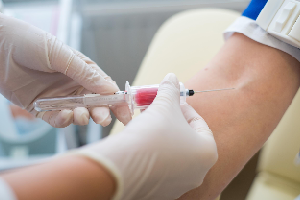What Is a Serologic Weak D Phenotype?
Download a free copy of 2015 Study

RHD genotyping not only identifies patients who are at risk for RhD alloimmunization and hemolytic disease of the fetus and newborn (HDFN), but it can also conserve Rh immune globulin (RhIG) supplies and contribute to a higher quality of care. Understanding variations in RhD is essential, then, for both patients and their healthcare providers.
The Rh Blood Group System
The Rh blood group system is the second most important blood group system in humans, following the ABO blood group system. It is also one of the most complex. The Rh blood group system is a set of red blood cell (RBC) surface proteins that likely function to maintain the integrity of the cell membrane.
The complexity of the Rh blood group system is demonstrated by its antigens and the highly polymorphic genes that encode them. The RHD gene encodes the RhD antigen, which is a large protein on the RBC membrane. People whose RBCs express the RhD antigen are considered RhD-positive, while those whose RBCs lack the RhD antigen are RhD-negative. Some people fall somewhere in between, as their RBCs express a variant of the RhD antigen.
The RhD antigen is highly immunogenic, meaning it may provoke a strong immune response. Individuals who are RhD-negative can produce anti-D upon exposure to the RhD antigen via transfusion or pregnancy with an RhD-positive fetus. The production of anti-D can cause hemolytic transfusion reactions in transfusion recipients or hemolytic disease of the fetus and newborn (HDFN) in pregnancy.
To prevent hemolytic transfusion reactions and RhD-associated HDFN, it is common practice to determine the RhD status of blood donors, transfusion recipients and pregnant women. Pregnant women who are RhD-negative receive injections of Rh immune globulin (RhIG) during pregnancy and following the delivery of an RhD-positive neonate to prevent HDFN in subsequent pregnancies.
Most RhD-positive individuals have a conventional RhD protein, but RHD variant genes can result in modified protein structure or low quantities of the antigen on RBCs. For example, approximately 0.2% to 1% of Caucasians have a serologic weak D phenotype, which presents as a weakened expression of the antigen. Although pregnant women with serologic weak D phenotypes are often treated conservatively as RhD-negative, a majority may be weak D types 1, 2 or 3, and can be safely managed as RhD-positive, meaning they do not need to receive RhIG prophylaxis and can receive RhD-positive blood if transfused. RHD genotyping can determine which of these individuals can be managed as RhD-positive, reducing unnecessary and costly administration of RhIG and conserving the RhD-negative blood supply.
Genetic Variations & Weak D
Chromosome 1 is the largest human chromosome, spanning approximately 249 million nucleotide base pairs. Chromosome 1 contains the two separate genes of the Rh system, one of which is the RHD gene that encodes the RhD antigen.
A variety of genetic rearrangements between the RHD and the other Rh system gene, RHCE, has created hybrid Rh genes known to encode a number of Rh antigens. To date, researchers have identified >50 Rh antigens, with the RhD antigen being among the most clinically important.
To date, more than 250 RhD variants have been reported, including weak D and partial D phenotypes. In general, weak D describes a quantitative change in the expression of the RhD antigens on RBCs, where as partial D describes incomplete RhD antigens.
Red blood cells that express conventional D antigen react strongly in routine laboratory testing, where RBCs are mixed with reagent anti-D, centrifuged, and then observed for agglutination. Red cells that express a serologic weak D phenotype are characterized by weak or negative reactivity in routine immediate spin testing, but moderate to strong reactivity upon the addition of antihuman globulin. Other RhD variants may be discovered due to discordant RhD typing results; that is, they may be reported as RhD-positive in one test and RhD-negative in another.
RHD genotyping can identify the specific gene variants associated with a serologic weak D phenotype or discordant RhD typings. This information can then guide practitioners in proper patient treatment to prevent alloimmunization in both pregnant women and transfusion recipients.
For more on this test and tips for patient management, download a free copy of “How do I manage Rh typing in obstetric patients?” by Haspel and Westhoff, 2015 here.
